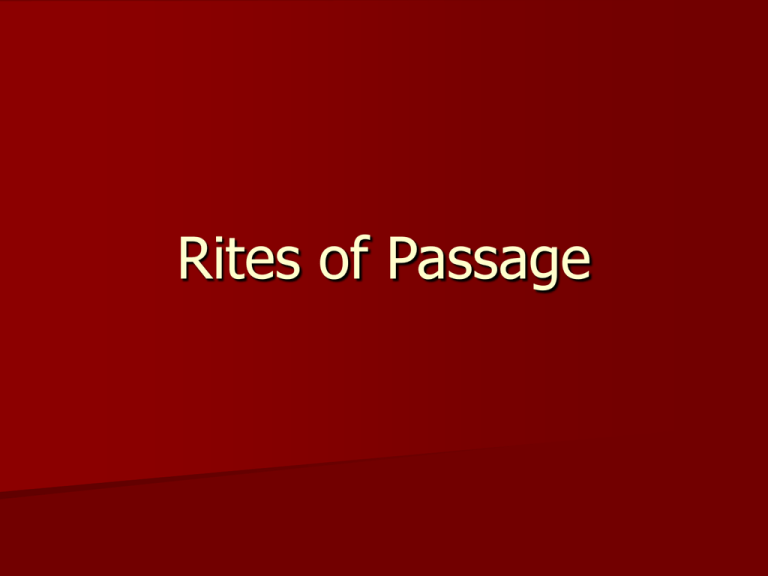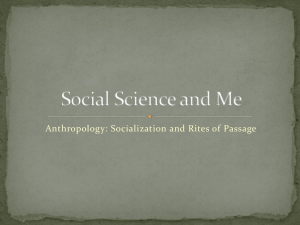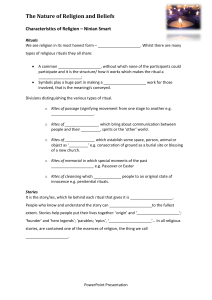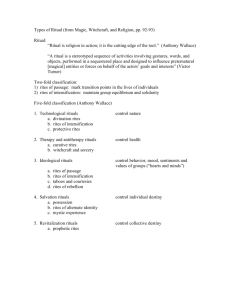Rites of Passage - MaderasOnlineClassroom
advertisement

Rites of Passage Key Terms and People Afterlife Cremation Cryonics Grief Cycle Inhumation Reincarnation Rites of Passage Rituals Doreen Kimura Elisabeth Kubler-Ross Arnold Van Gennep Rites of Passage A Rite of Passage is a ceremony that marks a person’s progress from one role, phase, or life, or social status to another. What are some Rites of Passage you can think of? Baptism First Communion Quinceañera Sweet 16s First Driver’s License First Date High School Graduation th 18 Birthday (In Ottawa) First Car First Job Weddings First House First Child Funerals Different cultures around the world all have rites of passage, and they follow a pattern. Birth, Puberty, Initiation into society, mating and reproduction, old age and death, are all times in our lives that we deal with these rites. Alongside these rites, there are rituals that go alongside these Rites. Three Stages of Transition 1. You are changed from what you were to something new. 2. You remove yourself from society temporarily. 3. You are re-admitted to society as a new person. Japanese Birth Tradition Page 128 Aiko…is this accurate? What happens after these rites? -New clothing -Jewellery -Body ornamentation Mehendi Parties Mehendi is the art of decorating women’s hands and feet with henna tattoos to celebrate weddings and other occasions. In India and Pakistan, a ceremony is made out of the need to decorate the bride. The bride asks the groom to find his initials in the henna. If he does, he “dominates” her and if he doesn’t, she “dominates” him. Body Piercings and Tattoos Why do we tattoo ourselves? Why do we get piercings? Reasons for Rites Why have human societies adopted rites of passage? 1. Help ease stress going through new experiences. 2. Give communities a pattern, allows them to anticipate consequences. 3. Entertainment Coming-of-age Ceremonies Most of the ceremonies we can think of have to do with the transition through puberty. As we go through the teen years, there are good and bad experiences, some alone, some with friends. A lot, even across cultures, have to do with preparing young adults for adulthood; strong enough to be productive members of society, and mature enough physically to reproduce. Initiations All over the world, different cultures have different rites that involve certain initiation rituals. A lot have to do with pain: Scars, mutilation, piercings, tattoos, etc. Others have to do with endurance: beatings, fasting, trials of pain, seclusion Regardless of the reasons why, there are usually new dress, ways of speaking, and lessons about morality and ways of the group (secular or religious). Amazon Tribal Initiation Scarification Physical Changes Different cultures around the world mark different physical changes with certain rituals as well. Body hair, Menstruation, Other physical changes through puberty, all of these things are marked by different societies and cultures. The Sciences Anthropologists look at rites of passage in terms of their relationship to history and cross-cultural studies. Psychologists look at the impact that these rites have on individuals and the role they play in mental health and stability Sociologists look at the place of these rites within the different social groupings of teens and explain the influence of gender, race, and economic status.







